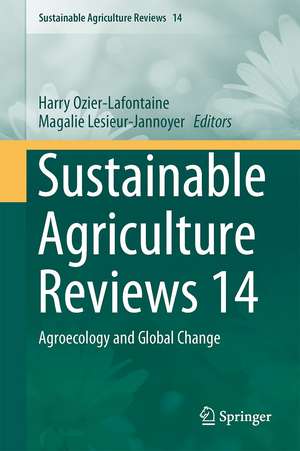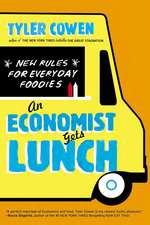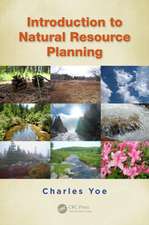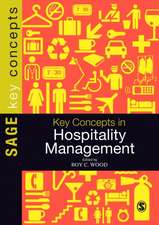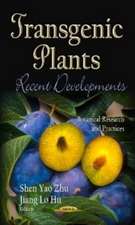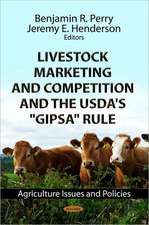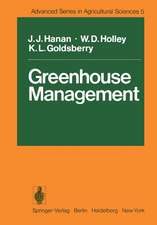Sustainable Agriculture Reviews 14: Agroecology and Global Change: Sustainable Agriculture Reviews, cartea 14
Editat de Harry Ozier-Lafontaine, Magalie Lesueur-Jannoyeren Limba Engleză Hardback – 16 sep 2014
| Toate formatele și edițiile | Preț | Express |
|---|---|---|
| Paperback (1) | 1227.67 lei 6-8 săpt. | |
| Springer International Publishing – 10 sep 2016 | 1227.67 lei 6-8 săpt. | |
| Hardback (1) | 1234.00 lei 6-8 săpt. | |
| Springer International Publishing – 16 sep 2014 | 1234.00 lei 6-8 săpt. |
Din seria Sustainable Agriculture Reviews
- 24%
 Preț: 783.49 lei
Preț: 783.49 lei - 15%
 Preț: 652.49 lei
Preț: 652.49 lei - 15%
 Preț: 641.71 lei
Preț: 641.71 lei - 18%
 Preț: 953.65 lei
Preț: 953.65 lei - 15%
 Preț: 648.24 lei
Preț: 648.24 lei - 5%
 Preț: 1106.69 lei
Preț: 1106.69 lei - 5%
 Preț: 1110.32 lei
Preț: 1110.32 lei - 18%
 Preț: 955.25 lei
Preț: 955.25 lei - 18%
 Preț: 1233.83 lei
Preț: 1233.83 lei - 18%
 Preț: 1123.35 lei
Preț: 1123.35 lei - 18%
 Preț: 1115.46 lei
Preț: 1115.46 lei - 18%
 Preț: 1117.03 lei
Preț: 1117.03 lei - 18%
 Preț: 1387.73 lei
Preț: 1387.73 lei - 18%
 Preț: 1222.80 lei
Preț: 1222.80 lei - 18%
 Preț: 1113.09 lei
Preț: 1113.09 lei - 18%
 Preț: 903.93 lei
Preț: 903.93 lei - 18%
 Preț: 1114.65 lei
Preț: 1114.65 lei - 18%
 Preț: 1223.11 lei
Preț: 1223.11 lei - 24%
 Preț: 1056.88 lei
Preț: 1056.88 lei - 20%
 Preț: 565.09 lei
Preț: 565.09 lei - 18%
 Preț: 1826.54 lei
Preț: 1826.54 lei - 18%
 Preț: 952.89 lei
Preț: 952.89 lei - 18%
 Preț: 955.08 lei
Preț: 955.08 lei - 18%
 Preț: 950.96 lei
Preț: 950.96 lei - 15%
 Preț: 649.71 lei
Preț: 649.71 lei - 18%
 Preț: 954.62 lei
Preț: 954.62 lei
Preț: 1234.00 lei
Preț vechi: 1504.88 lei
-18% Nou
Puncte Express: 1851
Preț estimativ în valută:
236.16€ • 245.64$ • 194.96£
236.16€ • 245.64$ • 194.96£
Carte tipărită la comandă
Livrare economică 14-28 aprilie
Preluare comenzi: 021 569.72.76
Specificații
ISBN-13: 9783319060156
ISBN-10: 3319060155
Pagini: 528
Ilustrații: XIV, 511 p. 181 illus.
Dimensiuni: 155 x 235 x 38 mm
Greutate: 0.91 kg
Ediția:2014
Editura: Springer International Publishing
Colecția Springer
Seria Sustainable Agriculture Reviews
Locul publicării:Cham, Switzerland
ISBN-10: 3319060155
Pagini: 528
Ilustrații: XIV, 511 p. 181 illus.
Dimensiuni: 155 x 235 x 38 mm
Greutate: 0.91 kg
Ediția:2014
Editura: Springer International Publishing
Colecția Springer
Seria Sustainable Agriculture Reviews
Locul publicării:Cham, Switzerland
Public țintă
GraduateCuprins
Preface.- Agroecology theory, controversy and governance.- Food and energy production from biomass in an integrated farming system.- Ecological intensification for crop protection.- Livestock farming systems and agro ecology in the tropics.- Cropping systems for soil biodiversity and ecosystem services; Cathy Clermont-Dauphin.- Agro ecology and grassland intensification and in the Caribbean.- Ecosystem services of multi specific and multi stratified cropping systems.- Agro ecological engineering to bio control soil pests for crop health.- Agro ecological resources for sustainable livestock farming in the humid tropics.- Agro ecology for farmers: the linguistic issue.- Soil quality and plant nutrition.- Soil science, plant nutrition and micro-farms.
Notă biografică
Eric Lichtfouse: PhD in organic geochemistry, INRA researcher in Dijon, France since 1992, he teaches scientific writing. He is also editor in chief of the INRA journal Agronomy for Sustainable Development, and founder and editor of the Springer journal Environmental Chemistry Letters.
Textul de pe ultima copertă
Sustainable agriculture is a rapidly growing field aiming at producing food and energy in a sustainable way for humans and their children. Sustainable agriculture is a discipline that addresses current issues such as climate change, increasing food and fuel prices, poor-nation starvation, rich-nation obesity, water pollution, soil erosion, fertility loss, pest control, and biodiversity depletion. Novel, environmentally-friendly solutions are proposed based on integrated knowledge from sciences as diverse as agronomy, soil science, molecular biology, chemistry, toxicology, ecology, economy, and social sciences. Indeed, sustainable agriculture decipher mechanisms of processes that occur from the molecular level to the farming system to the global level at time scales ranging from seconds to centuries. For that, scientists use the system approach that involves studying components and interactions of a whole system to address scientific, economic and social issues. In that respect, sustainable agriculture is not a classical, narrow science. Instead of solving problems using the classical painkiller approach that treats only negative impacts, sustainable agriculture treats problem sources. Because most actual society issues are now intertwined, global, and fast-developing, sustainable agriculture will bring solutions to build a safer world. This book series gathers review articles that analyze current agricultural issues and knowledge, then propose alternative solutions. It will therefore help all scientists, decision-makers, professors, farmers and politicians who wish to build a safe agriculture, energy and food system for future generations.
Caracteristici
The book (and series) is a state of the art on the latest research in sustainable agriculture This book series gathers review articles that analyze current agricultural issues and knowledge, then propose alternative solutions Covering multidisciplinary topics it will help all scientists, decision-makers, professors, farmers and politicians who wish to build a safe agriculture, energy and food system for future generations
